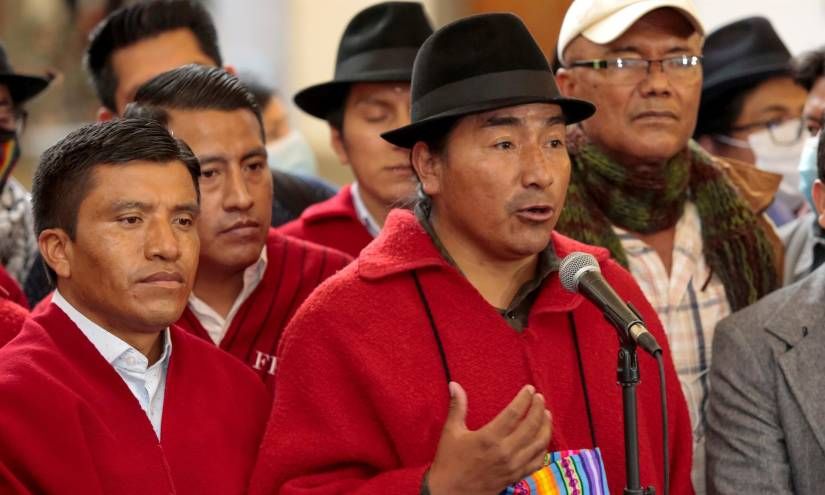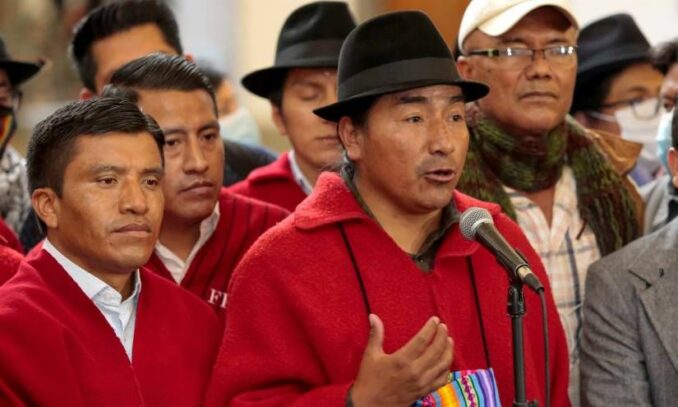

Leonidas Iza, president of the Confederation of Indigenous Nationalities of Ecuador, at microphone, with other CONAIE leaders.
Ibarra, Imbabura Province, Ecuador
June 26 — The Indigenous-led National Strike in Ecuador that began June 13 enters its third week on June 27, as the people once again show their power in the streets and highways.
Roadblocks in 23 provinces have closed every paved road in Ecuador. The masses have said, “Enough!” to banker President Guillermo Lasso and five years of a brutal neoliberal economic war that has deepened the poverty of the Indigenous, peasants and the precarious working poor who labor in the informal economy.
Roadblocks are a huge weapon in the hands of the peasants — their economic response to the crushing neoliberal assault — just as workers withhold their labor in the class struggle.
The National Strike of June 2022 is deeper and more profound than the uprising of October 2019 against then-President Lenín Moreno. The causes reflect the impact of the COVID-19 pandemic, neoliberal austerity, massive public sector and health care layoffs, the surge in narcotics trafficking and prison riots with more than 400 prisoners massacred since February 2021.
Today Ecuadorians suffer inflation that makes an adequate diet unaffordable for the poor, who are trapped in a spiral of impoverishment, deinstitutionalization and violence. Nearly two-thirds of employed workers have no social security, which means that their jobs and livelihood are precarious.
‘The struggle is resistance’


Leonidas Iza, president of the Confederation of Indigenous Nationalities of Ecuador, at microphone, with other CONAIE leaders.
True to its glorious history of resistance dating back to the 1500s, when they fought against the Spanish conquest, the Indigenous movement of today is shaking the country. Leonidas Iza, president of the Confederation of Indigenous Nationalities of Ecuador (CONAIE), led an Assembly of the Peoples June 25 in Quito, the capital. Iza urged the people to stay focused and to conserve their strength. He said, “The struggle is resistance.”
Iza defined the struggle this way: “We met with all the authorities of the peoples and nationalities last night until the wee hours of this morning. We have made it absolutely clear why we are here. Let there be no confusion, comrades. We are here to take up the Ten Points in response to our communities and our peoples, comrades . . . As long as we stay here in the city of Quito, we will also guarantee the actions at the national level in all the provinces.
“This is the struggle. It is clear to us that we have already won some points. But the central issues have not been won yet. Fuel. There is still no answer to the issue of affordable prices. There is no answer to the financial question. There is still no answer to the mining and oil issues. Our points are the Ten Points that have not yet been resolved.” (Transcribed and translated from CONAIE video)
The Ten Points involve reduction and control of fuel prices, moratorium and renegotiation of personal and family debts, fair prices for peasant agricultural production, promotion of employment and labor rights, moratorium on mining and oil extraction, respect for the 21 collective rights, no privatization of strategic sectors and public patrimony, control of basic prices and speculation, budget for health and education, effective security and protection policies. (10 Points — tinyurl.com/26znx3zj)
Economist Jonathan Báez reported on the question of “employed people who do not have social security, which shows that they are in precarious jobs. Thus, if in May 2021, this level was 62%, by March 2022 it will be 66%.” (Institute of Economic Investigations, May 25)
The strike in Ibarra
On June 20, 3,000 people marched miles down the mountain into Ibarra from the Indigenous farming communities in the heights south of the city. Men, women with children and elders were greeted warmly by the merchants in the markets.
An Afro-Ecuadorian vendor told Workers World: “We support the strike because we all feel the calamity of the economic crisis. We support strikes like this of our Karanki people who come with respect, without violence, without attacking us merchants. We are united with our Karanki people.”
Residents of Ibarra are collecting food and donating money to support the protest in Quito. One, Zoila Ramírez, told WW, “I can’t be in Quito to help out, but I’m part of the resistance.”
Tens of thousands of Indigenous people marched or rode in caravans to Quito from the provinces. Thousands marched 40 miles on June 20, from Cayambe to Quito, and braved clouds of tear gas near Guayllabamba, a town near Quito.
State brutality
One young man from Guayllabamba died in a fall, while trying to escape the tear gas thrown by police and the soldiers who tried to stop the marchers and their caravan. Another injured marcher was struck in the forehead by a tear-gas canister.
A state of exception (martial law) and curfews were declared in six provinces, and police murdered five more protesters. In Puyo, Pastaza Province, a young Indigenous leader was killed by a tear-gas canister fired into his skull at close range on June 21. This gruesome assassination angered people and exposed the fascist and racist reality behind the facade of Ecuadorian democracy.
Chilling scenes of squadrons of police gassing peaceful marchers, young and old, women and children, elicited denunciations from human rights and U.N. observers. Clouds of gas were visible through the parks which border the Casa de la Cultura (House of Culture).
Police raided the Casa then occupied it as a barracks. Under public pressure police abandoned the Casa and then bombed it with gas when the movement used the House of Culture as a refuge and a rallying place. University campuses which served as refuges for the movement were attacked with tear gas during the night hours.
It’s clear that the government has turned to brute force as its only means to achieve order, when the president has an 83% disapproval rating after only one year in office. Fascistic vandals and infiltrating provocateurs were doing the dirty work needed by the government and corporate media campaign to smear the National Strike and criminalize Indigenous people.
Indigenous movement’s tactics
The Indigenous movement publicly eschews violence. They hold Assemblies of the People; they march; they tend the wounded and find some rest in university spaces, despite the vicious police gas-bombing of their shelters day and night.
Indigenous communes in the provinces are mobilized to send food and whatever else is needed by their comrades in Quito, including transporting replacements for the wounded who return home.
On day 13 of the strike, hundreds of Indigenous women, feminists and dissidents assembled for a cleansing ceremony at the Plaza José Martí in Quito and marched to the Central University for an Assembly of Women.
After two weeks the government recognizes five deaths; eight people have disappeared, and hundreds are injured, some seriously. On June 26 the National Assembly debated the possible impeachment of President Lasso, but pro-impeachment forces lacked the necessary votes.
Solidarity from urban sectors including students, feminists, trade unions and laborers in the precarious informal economy can help the strike. Transport workers are expected to join the National Strike June 27. The Pan American Highway is closed. Buses are not operating.
Divisions among the people are a problem for the strike and are fraught with racism that stems from five centuries of colonialism. Racism marginalizes the Indigenous movement, whose glorious history of resistance has opened the door to the resistance of today.
Because they live from day to day, many urban workers in the precarious informal economy don’t participate in a strike, which they may support. The outcome of this unprecedented uprising is to be determined.
Mike Otto transcribed and/or translated the cited statements.
As part of Workers World newspaper’s coverage marking the 50th anniversary of the liberation of…
From the PFLP Central Media Office The following statement from the Popular Front for the…
Newark, New Jersey Over 250 people, representing over 250 New Jersey endorsing community groups, attended…
Special to Workers World The following is a press release issued on April 24, 2025,…
dear Larry Krasner, we heard you sued Elon Musk over his corrupt million election giveaways…
Unions join forces against harassment and deportation of members When 200 immigrant workers – from…